
Heraklion: The Beating Heart of Crete
Heraklion, the vibrant capital of Crete, is a treasure trove of history, culture, and natural beauty. As you wander through its bustling streets, you'll discover a unique blend of ancient ruins and modern charm. The city's rich past is evident in its impressive landmarks, such as the Palace of Knossos, where the legend of the Minotaur was born. This archaeological wonder offers a fascinating glimpse into the Minoan civilization, one of the earliest in Europe. The Venetian Harbor and Fortress provide another captivating link to Heraklion's storied past. Stroll along the picturesque waterfront, where you can enjoy the sight of colorful fishing boats and sample fresh seafood at one of the many seaside tavernas. The fortress, known as Koules, stands as a sentinel at the harbor's entrance, offering panoramic views of the city and the sparkling Aegean Sea. Heraklion is not just about history, though. The city is alive with contemporary culture, from its vibrant nightlife to its thriving arts scene. The Heraklion Archaeological Museum houses an extraordinary collection of artifacts, while the city's many galleries and theaters showcase the best of modern Greek creativity. Don't miss the chance to explore the local markets, where you can find everything from artisanal cheeses to handcrafted souvenirs. Whether you're a history buff, a foodie, or simply looking to soak up the sun on beautiful beaches, Heraklion has something to offer every traveler. Its warm, welcoming atmosphere and diverse attractions make it a must-visit destination on the island of Crete.
Local tips in Heraklion
- Visit the Palace of Knossos early in the morning to avoid the crowds and the heat.
- Try the local delicacy, dakos, a traditional Cretan salad made with barley rusk, tomatoes, and feta cheese.
- Take a leisurely evening stroll along the Venetian Harbor for the best sunset views.
- If you're planning to visit the Heraklion Archaeological Museum, consider purchasing a combined ticket that includes entry to the Palace of Knossos.
- Renting a car can be a convenient way to explore the surrounding areas and hidden gems of Crete.
Heraklion: The Beating Heart of Crete
Heraklion, the vibrant capital of Crete, is a treasure trove of history, culture, and natural beauty. As you wander through its bustling streets, you'll discover a unique blend of ancient ruins and modern charm. The city's rich past is evident in its impressive landmarks, such as the Palace of Knossos, where the legend of the Minotaur was born. This archaeological wonder offers a fascinating glimpse into the Minoan civilization, one of the earliest in Europe. The Venetian Harbor and Fortress provide another captivating link to Heraklion's storied past. Stroll along the picturesque waterfront, where you can enjoy the sight of colorful fishing boats and sample fresh seafood at one of the many seaside tavernas. The fortress, known as Koules, stands as a sentinel at the harbor's entrance, offering panoramic views of the city and the sparkling Aegean Sea. Heraklion is not just about history, though. The city is alive with contemporary culture, from its vibrant nightlife to its thriving arts scene. The Heraklion Archaeological Museum houses an extraordinary collection of artifacts, while the city's many galleries and theaters showcase the best of modern Greek creativity. Don't miss the chance to explore the local markets, where you can find everything from artisanal cheeses to handcrafted souvenirs. Whether you're a history buff, a foodie, or simply looking to soak up the sun on beautiful beaches, Heraklion has something to offer every traveler. Its warm, welcoming atmosphere and diverse attractions make it a must-visit destination on the island of Crete.
Iconic landmarks you can’t miss
Heraklion Archaeological Museum
Explore 5,500 years of Cretan history at the Heraklion Archaeological Museum, home to the world's most important Minoan collection.
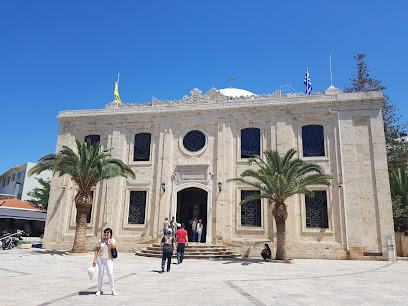
Morosini Fountain
A Venetian masterpiece in Heraklion's heart, the Morosini Fountain blends history, art, and social significance in Lions Square. A must-see landmark!
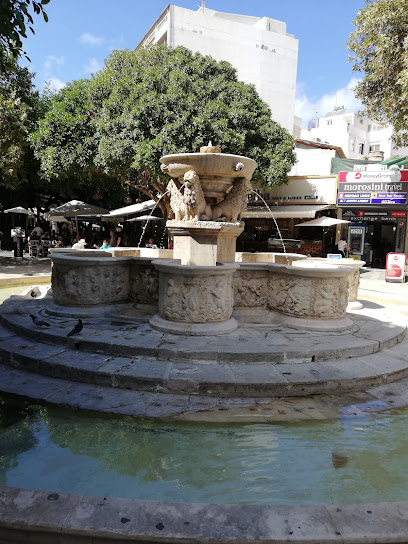
Rocca a Mare Fortress
Explore the historic Rocca a Mare Fortress in Heraklion: a Venetian-era landmark offering stunning views and a glimpse into Crete's maritime past.
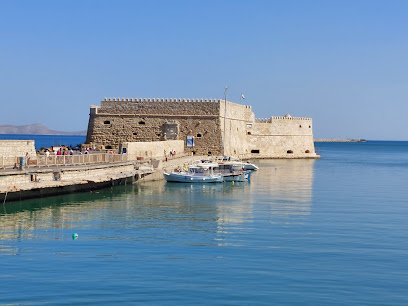
Heraklion Venetian Port
Explore the historic Venetian Port of Heraklion, Crete: a vibrant blend of Venetian and Ottoman architecture with stunning sea views and rich maritime history.
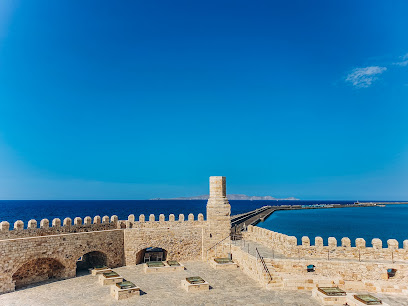
Venetian Walls of Heraklion
Explore the historic Venetian Walls of Heraklion, a testament to Crete's rich past and a stunning example of 15th-century military architecture.
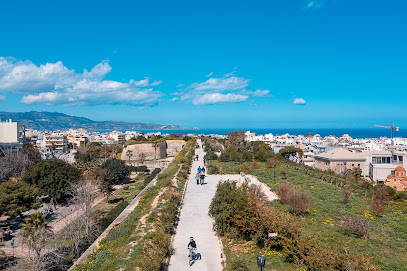
Museum of Ancient Greek Technology by Kotsanas
Explore the innovative world of ancient Greek technology at the Kotsanas Museum in Heraklion, a showcase of ingenuity and invention.
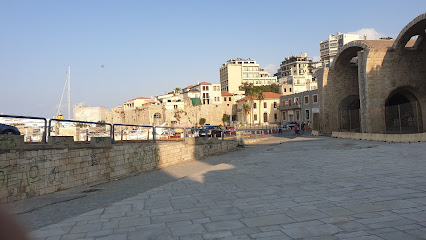
Kenouryia Porta
Discover Kenouryia Porta, a historic Venetian gate in Heraklion, Crete, offering a glimpse into the island's rich past and architectural heritage.
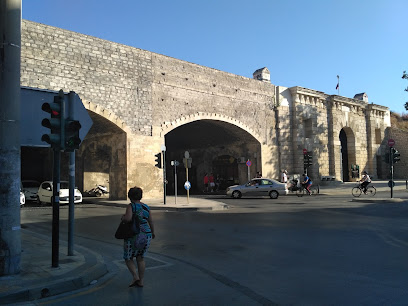
Statue of Erotokritos
A tribute to Cretan literature, the Statue of Erotokritos in Heraklion captures the romance and valor of a timeless epic.
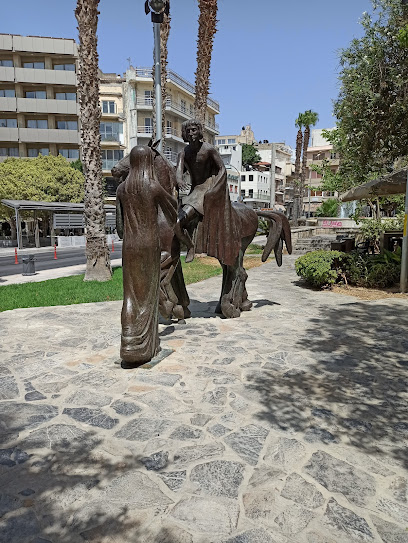
Προτομή Γιούρι Γκαγκάριν
Commemorating the first human in space, Yuri Gagarin's bust stands as a symbol of Greek-Russian friendship on Heraklion's vibrant waterfront.
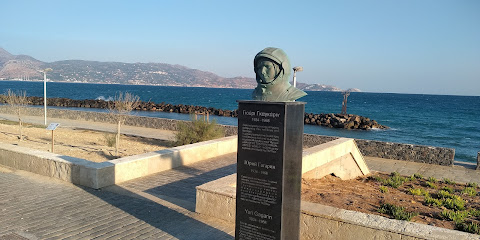
Herakleion Unknown Soldier Statue
A tribute to the fallen heroes of Greece, the Unknown Soldier Statue in Heraklion stands as a symbol of national pride and remembrance.
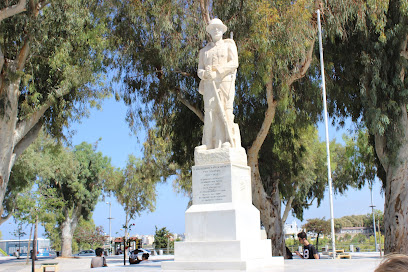
Mermaid of Heraklion
Discover the enchanting Mermaid of Heraklion, a symbol of art and maritime history on Crete's captivating Gulf of Heraklion.
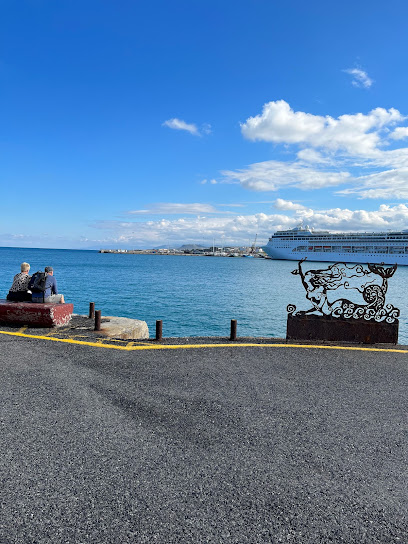
Monument to the Battle of Crete
A tribute to the brave defenders of Crete during WWII, commemorating their courage and sacrifice in the face of overwhelming odds.
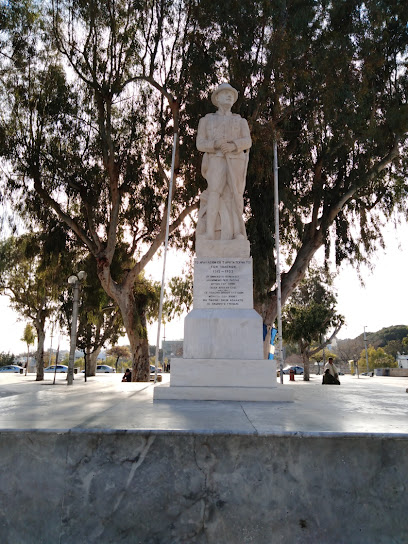
Yenicar Aga Fountain
Discover the Yenicar Aga Fountain in Heraklion, a historical landmark showcasing Ottoman architecture and a testament to Crete's diverse cultural heritage.
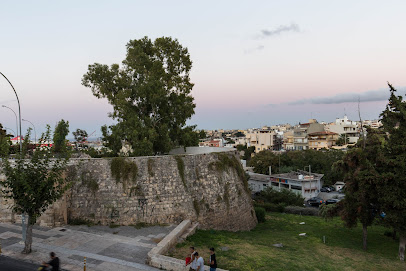
Old Anchor
Discover Heraklion's maritime past at the Old Anchor, a waterfront landmark with stunning views and a rich history.
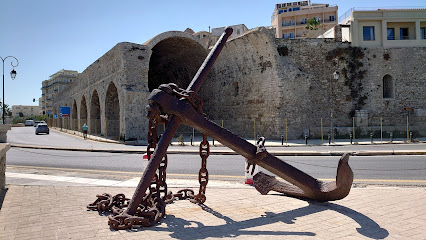
Tsachaki House
Explore Tsachaki House in Heraklion: A historical landmark showcasing Crete's unique architecture and cultural heritage.
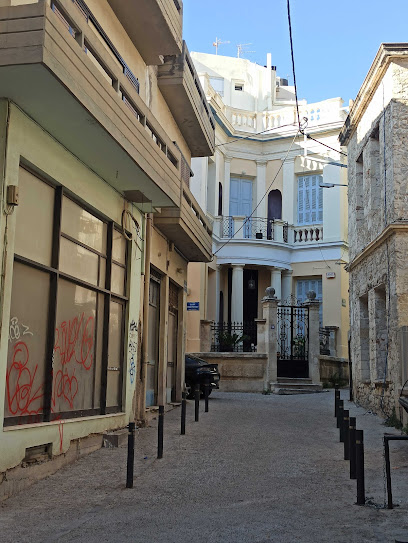
Essential places to dine
Peskesi
Discover authentic Cretan flavors at Peskesi - where tradition meets taste in every dish.
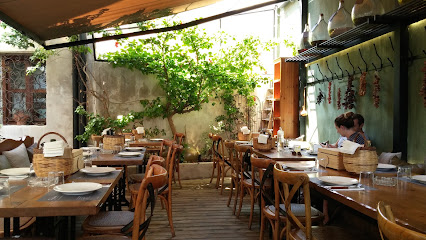
Apiri greek_eatery
Discover the authentic taste of Greece at Apiri Greek Eatery in Heraklion – where every meal is a celebration of Mediterranean culinary traditions.
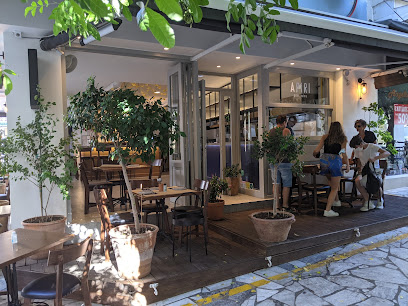
Erganos
Discover Erganos: A Culinary Haven in Heraklion Offering Authentic Greek Dishes in a Cozy Atmosphere.
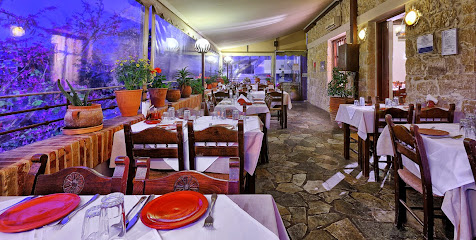
KOUZEINERI
Experience authentic Cretan cuisine at Kouzeineri in Heraklion – where tradition meets taste in every delightful dish.
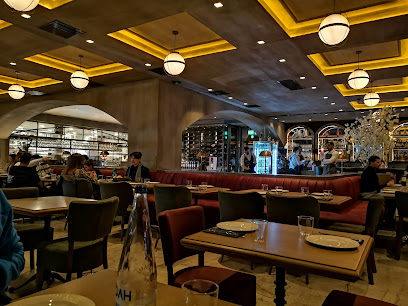
Amalia's Kitchen
Discover authentic Cretan flavors at Amalia's Kitchen in Heraklion – where tradition meets culinary excellence.
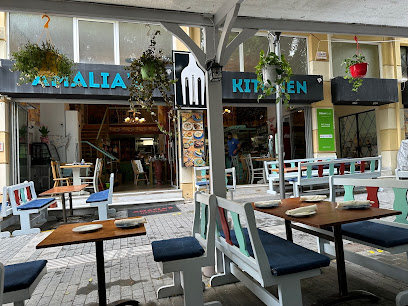
Koukouvagia
Discover the flavors of Greece at Koukouvagia in Heraklion – where tradition meets culinary excellence.
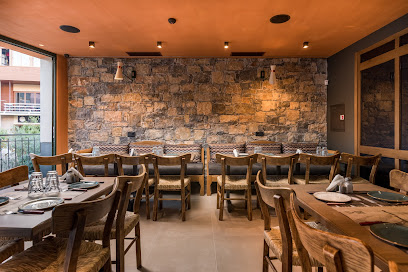
Ntoré Gastronomy
Experience the rich flavors of Cretan cuisine at Ntoré Gastronomy, where tradition meets innovation in every dish.
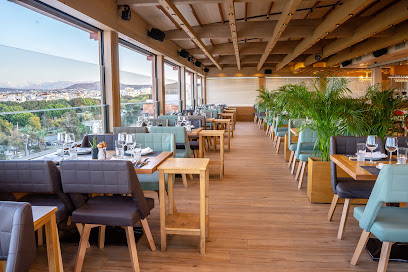
The chickpea
Discover authentic Mediterranean flavors at The Chickpea in Heraklion - where every dish tells a story of tradition and freshness.
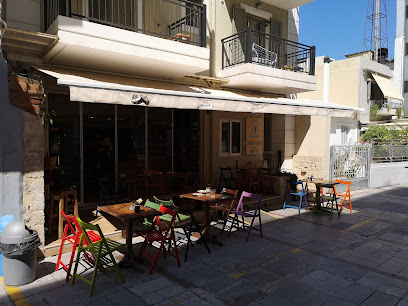
Athali Cretan Cuisine
Experience authentic Cretan flavors at Athali Cretan Cuisine in Heraklion - where tradition meets taste.
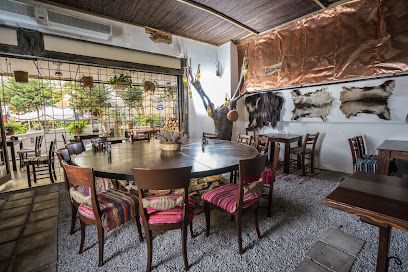
Veneto
Experience authentic Greek cuisine at Veneto in Heraklion – where tradition meets taste in every delightful dish.
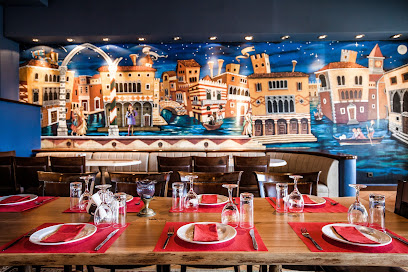
Archipelagos Seafood Restaurant
Experience exquisite seafood dining in Heraklion at Archipelagos Seafood Restaurant – where fresh flavors meet Cretan hospitality.
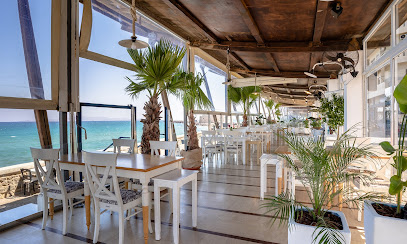
Herbs' Garden
Discover the enchanting flavors of Cretan cuisine at Herbs' Garden in Heraklion, where stunning views meet delightful dishes.
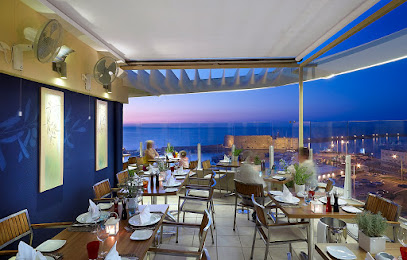
Markets, malls and hidden boutiques
Irida Family Workshop
Explore the Irida Family Workshop for unique handcrafted souvenirs, showcasing the best of Cretan craftsmanship and artistry.
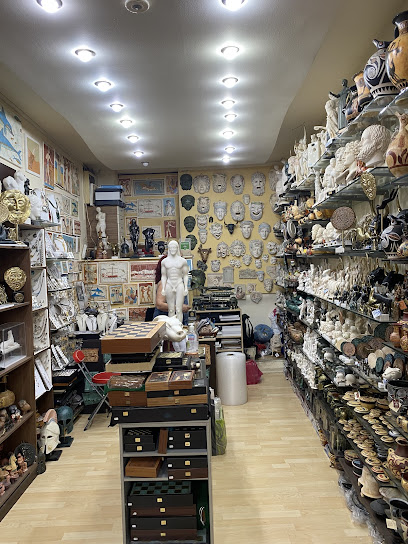
ZALO
Explore ZALO in Heraklion for unique gifts and local treasures that embody the spirit of Crete.
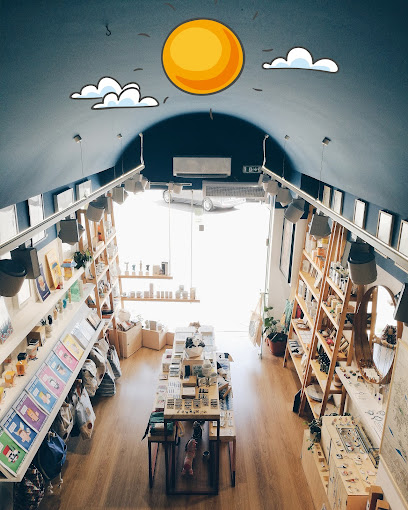
AROMATTIKA The Store
Discover AROMATTIKA in Heraklion, where unique Greek handicrafts and delightful novelties come to life in a charming embroidery shop.
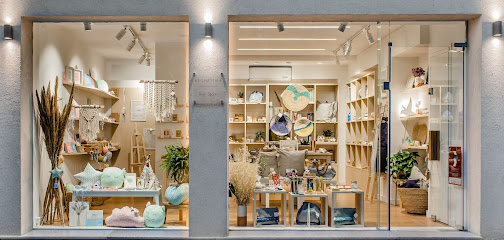
Flying Circus Vintage
Explore the charm of vintage fashion at Flying Circus Vintage in Heraklion, Crete—a must-visit for unique clothing and accessories.
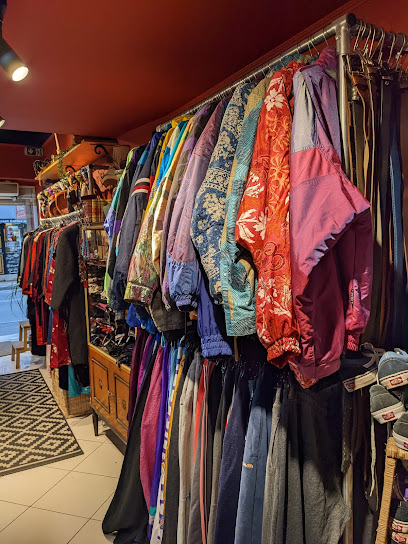
Mayaba Store
Discover unique gifts, antiques, and handcrafted furniture at Mayaba Store in Heraklion - a shopping gem that captures the essence of Crete.
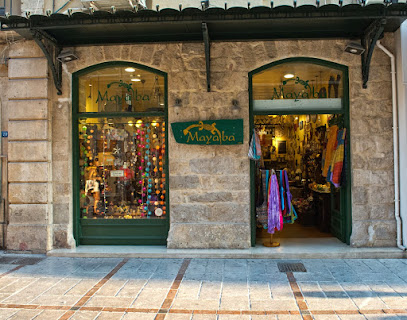
Spirit of Greece
Discover unique Greek souvenirs at Spirit of Greece in Heraklion, where every item carries a story of culture and tradition.
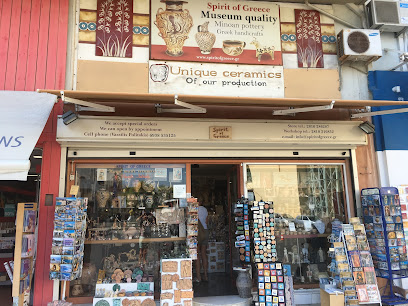
Souvenirs & Cretan products
Explore the essence of Crete at Souvenirs & Cretan Products, where authentic local treasures await every traveler.
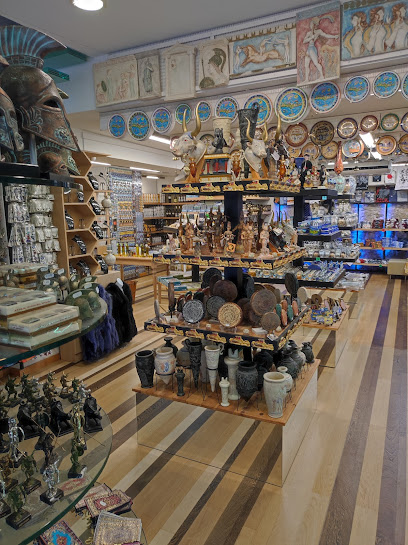
Showroom Fashion Boutique Ηράκλειο
Explore the latest trends at Showroom Fashion Boutique in Heraklion, where style meets quality in a chic shopping experience.
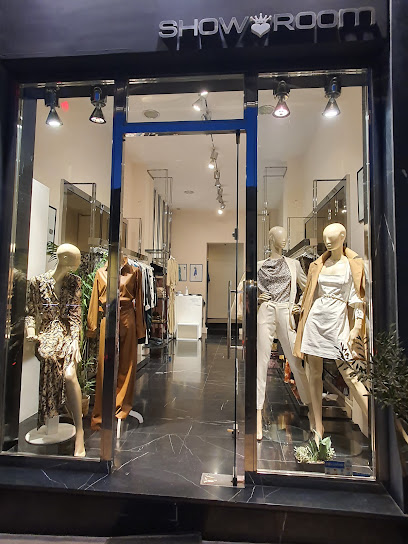
Soho Multibrand Boutique
Explore unique women's fashion at Soho Multibrand Boutique in Heraklion, where style meets local charm and trendy designs await.
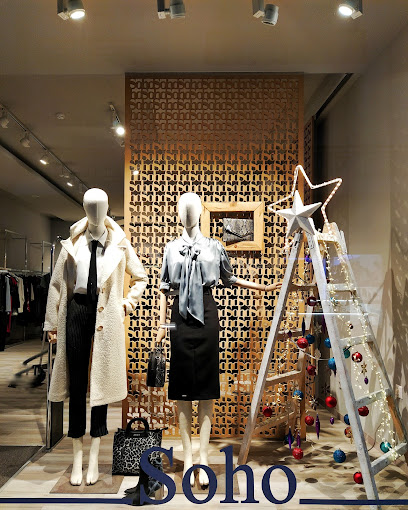
GALANI BOTTEGA - exclusive department store
Experience the luxury of shopping at Galani Bottega, your destination for high-end fashion, cosmetics, and accessories in an elegant atmosphere.
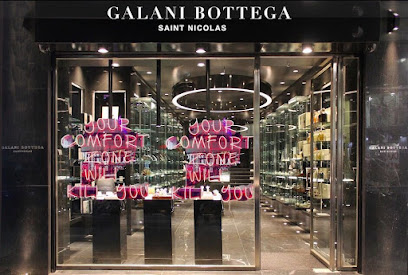
Essential bars & hidden hideouts
Xalavro Open Bar
Discover the vibrant atmosphere and unique cocktails at Xalavro Open Bar, a premier cocktail destination in Heraklion, Greece.
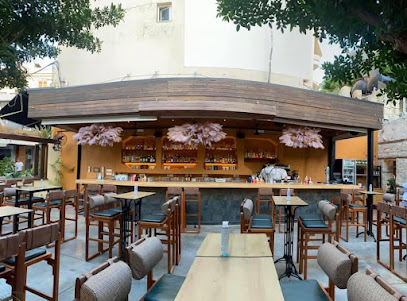
Swing Thing
Experience the vibrant nightlife of Heraklion at Swing Thing, the ultimate cocktail bar with a creative drink menu and lively atmosphere.
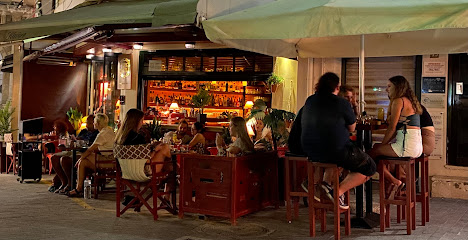
Manjar Wise Food, Coffee & Wine Bar
Discover Manjar Wise Food, Coffee & Wine Bar in Heraklion, where exquisite flavors meet a vibrant atmosphere for an unforgettable dining experience.
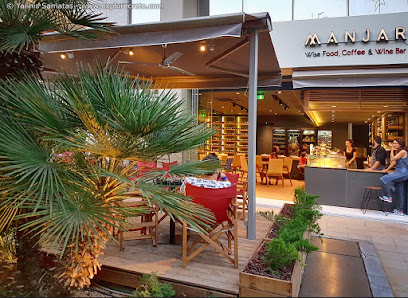
The Bitters Bar
Discover the vibrant ambiance and innovative cocktails at The Bitters Bar in Heraklion, where every sip is a celebration of flavor and creativity.
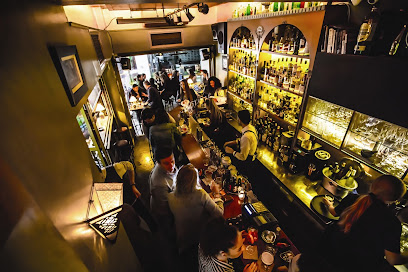
Jailhouse Rock Bar
Discover the vibrant nightlife of Heraklion at Jailhouse Rock Bar, a unique venue known for its fantastic rum selection and lively atmosphere.
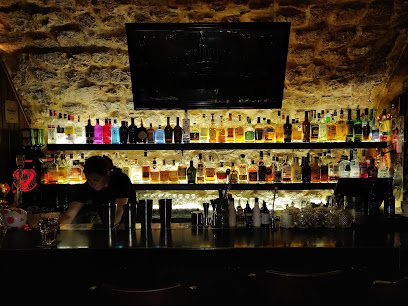
Guernica
Discover Guernica in Heraklion, where vibrant nightlife, great music, and delicious drinks create an unforgettable experience.
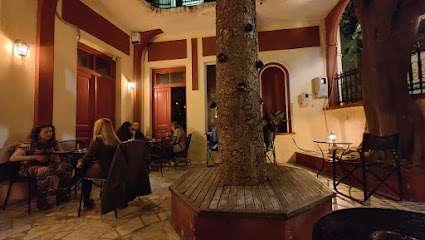
La Brasserie
Experience the vibrant spirit of Heraklion at La Brasserie, a cozy bar and coffee shop perfect for travelers seeking relaxation and local culture.
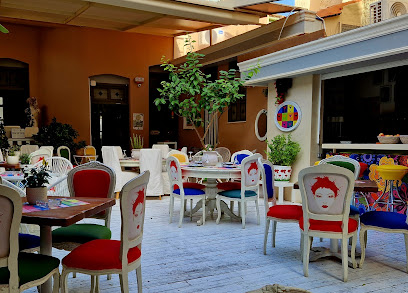
Rock n Rolling Stone
Rock n Rolling Stone: Heraklion's vibrant bar scene offering live music, eclectic drinks, and a lively atmosphere for unforgettable nights.
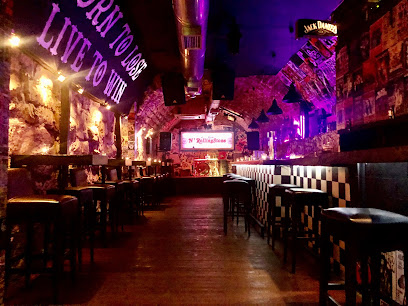
Stone Project
Experience the essence of Heraklion nightlife at Stone Project, where every cocktail is a masterpiece and the atmosphere is electric.
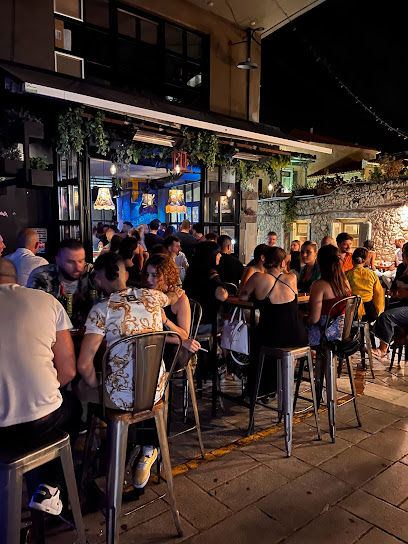
Take Five
Experience the vibrant nightlife of Heraklion at Take Five, a beloved bar and cafe known for its cocktails, local flavors, and lively atmosphere.
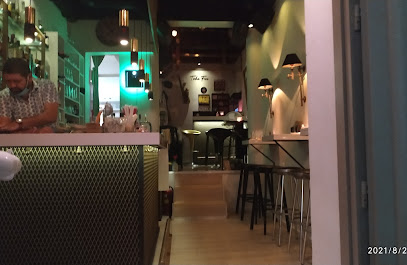
Local Phrases
-
- HelloΓεια σας
[Ya sas] - GoodbyeΑντίο
[Adio] - YesΝαι
[Ne] - NoΌχι
[Ohi] - Please/You're welcomeΠαρακαλώ
[Parakalo] - Thank youΕυχαριστώ
[Efharisto] - Excuse me/SorryΣυγνώμη
[Signomi] - How are you?Πώς είστε;
[Pos iste?] - Fine. And you?Καλά. Εσείς;
[Kala. Esis?] - Do you speak English?Μιλάτε αγγλικά;
[Milate anglika?] - I don't understandΔεν καταλαβαίνω
[Den katalaveno]
- HelloΓεια σας
-
- I'd like to see the menu, pleaseΘα ήθελα να δω το μενού, παρακαλώ
[Tha ithela na do to menu, parakalo] - I don't eat meatΔεν τρώω κρέας
[Den troo kreas] - Cheers!Υγεία!
[Ygeia!] - I would like to pay, pleaseΘα ήθελα να πληρώσω, παρακαλώ
[Tha ithela na plirosso, parakalo]
- I'd like to see the menu, pleaseΘα ήθελα να δω το μενού, παρακαλώ
-
- Help!Βοήθεια!
[Voithia!] - Go away!Φύγε!
[Fyge!] - Call the Police!Καλέστε την αστυνομία!
[Kaleste tin astinomia!] - Call a doctor!Καλέστε ένα γιατρό!
[Kaleste ena giatro!] - I'm lostΈχω χαθεί
[Eho hatei] - I'm illΕίμαι άρρωστος
[Eime arrostos]
- Help!Βοήθεια!
-
- I'd like to buy...Θα ήθελα να αγοράσω...
[Tha ithela na agoraso...] - I'm just lookingΑπλά κοιτάω
[Apla kitao] - How much is it?Πόσο κοστίζει;
[Poso kostizi?] - That's too expensiveΑυτό είναι πολύ ακριβό
[Afto ine poli akribo] - Can you lower the price?Μπορείτε να χαμηλώσετε την τιμή;
[Borite na hamilosete tin timi?]
- I'd like to buy...Θα ήθελα να αγοράσω...
-
- What time is it?Τι ώρα είναι;
[Ti ora ine?] - It's one o'clockΕίναι μία ώρα
[Ine mia ora] - Half past (10)Μισή (10)
[Misi (10)] - MorningΠρωί
[Proi] - AfternoonΑπόγευμα
[Apogevma] - EveningΒράδυ
[Vradi] - YesterdayΧθες
[Hthes] - TodayΣήμερα
[Simera] - TomorrowΑύριο
[Aurio] - 1Ένα
[Ena] - 2Δύο
[Dio] - 3Τρία
[Tria] - 4Τέσσερα
[Tessera] - 5Πέντε
[Pente] - 6Έξι
[Exi] - 7Εφτά
[Efta] - 8Οχτώ
[Ohto] - 9Εννιά
[Ennia] - 10Δέκα
[Deka]
- What time is it?Τι ώρα είναι;
-
- Where's a/the...?Πού είναι ένα/το...;
[Pou ine ena/to...?] - What's the address?Ποια είναι η διεύθυνση;
[Poia ine i diefthinsi?] - Can you show me (on the map)?Μπορείτε να μου δείξετε (στο χάρτη);
[Borite na mou dixete (sto charti)?] - When's the next (bus)?Πότε είναι το επόμενο (λεωφορείο);
[Pote ine to epomeno (leoforeio)?] - A ticket (to ....)Ένα εισιτήριο (προς ....)
[Ena isitirio (pros ....)]
- Where's a/the...?Πού είναι ένα/το...;
History of Heraklion
-
Heraklion, known as 'Herakleion' in antiquity, is closely linked to the Minoan civilization, one of the earliest advanced societies in Europe. The nearby archaeological site of Knossos, believed to be the palace of King Minos, showcases the sophisticated art, architecture, and culture of this Bronze Age civilization. The significance of Heraklion as a center of trade and culture continued as it flourished under Minoan rule.
-
From the 13th to the 17th century, Heraklion was a vital port city under Venetian rule. The Venetians fortified the city, constructing impressive walls and bastions that still stand today. This period saw a cultural renaissance, with the introduction of Venetian architecture, art, and governance, which shaped the city’s identity. The Loggia, a fine example of Venetian architecture, served as a social and administrative hub.
-
Following the fall of Heraklion to the Ottomans in 1669, the city underwent significant changes. The Ottomans left a lasting mark on the city's architecture and culture, introducing mosques and other public buildings. The historic Mosque of Kazantzakis, named after the famous Cretan author, is a testament to this era. While the Ottomans ruled, the city remained a crucial trade center in the Eastern Mediterranean.
-
The late 19th and early 20th centuries were marked by Cretan revolts against Ottoman rule, with Heraklion playing a central role. The Cretan Revolt of 1897 led to international intervention and ultimately to the unification of Crete with Greece in 1913. This period was characterized by a strong sense of national identity and a revival of Cretan culture, reflected in the arts and literature.
-
In May 1941, Heraklion was a key site during the Battle of Crete, the first major airborne invasion in history. The city endured significant destruction and loss during the conflict. Post-war, Heraklion underwent reconstruction, and the historical scars of war have since contributed to its resilience and the rich narrative of its past.
Heraklion Essentials
-
Heraklion is well-connected to other neighborhoods in Crete. The main transportation hub is the central bus station (KTEL) where you can find regular intercity bus services to popular destinations such as Chania, Rethymno, and Agios Nikolaos. Additionally, Heraklion International Airport (HER) serves both domestic and international flights, making it easy to arrive directly by air.
-
Within Heraklion, public buses are an efficient way to navigate the city and surrounding areas. The local bus system is reliable and covers major attractions. Taxis are readily available but can be more expensive. Bicycles can be rented for a more leisurely exploration of the city, and walking is a great option for visiting nearby sites such as the Heraklion Archaeological Museum and the Venetian Harbor.
-
Heraklion is generally safe for tourists, but standard precautions are advisable. Avoid poorly lit areas at night and keep valuables secure. While violent crime is rare, petty theft can occur, especially in crowded places. Areas around busy markets may have higher instances of pickpocketing, so stay vigilant.
-
In case of emergencies, dial 112 for immediate assistance in Greece. The local police station and hospitals are available in Heraklion. It's advisable to have travel insurance that includes medical coverage. For minor health issues, local pharmacies can provide over-the-counter medications and advice.
-
Fashion: Do dress modestly, especially when visiting churches and monasteries. Don't wear beachwear away from the beach. Religion: Do respect local customs and traditions. When entering a church, cover your shoulders and legs. Public Transport: Do be courteous and offer your seat to elderly passengers. Don’t eat or drink on public transport. Greetings: Do greet locals with a friendly 'Kalimera' (Good morning). Don’t rush through greetings; take a moment to acknowledge people. Eating & Drinking: Do try local dishes like moussaka and dakos. Don't refuse food or drink offered by locals, as it’s considered impolite.
-
To experience Heraklion like a local, visit the central market (Agora) for fresh produce and local delicacies. Engage with shopkeepers and try traditional snacks. Explore off-the-beaten-path neighborhoods such as the old town or the suburbs for authentic dining experiences. Attend local festivals or events to immerse yourself in Cretan culture.
Trending Landmarks in Heraklion
-
Heraklion Archaeological Museum
-
Morosini Fountain
-
Rocca a Mare Fortress
-
Heraklion Venetian Port
-
Venetian Walls of Heraklion
-
Museum of Ancient Greek Technology by Kotsanas
-
Kenouryia Porta
-
Statue of Erotokritos
-
Προτομή Γιούρι Γκαγκάριν
-
Herakleion Unknown Soldier Statue
-
Mermaid of Heraklion
-
Monument to the Battle of Crete
-
Yenicar Aga Fountain
-
Old Anchor
-
Tsachaki House
Nearby Cities to Heraklion
-
Things To Do in Crete
-
Things To Do in Rethymno
-
Things To Do in Chania
-
Things To Do in Pyrgos
-
Things To Do in Santorini
-
Things To Do in Mykonos
-
Things To Do in Kos
-
Things To Do in Bodrum
-
Things To Do in Rhodes
-
Things To Do in Samos
-
Things To Do in Athens
-
Things To Do in Nafplio
-
Things To Do in Marmaris
-
Things To Do in Kalamata
-
Things To Do in Kusadasi













